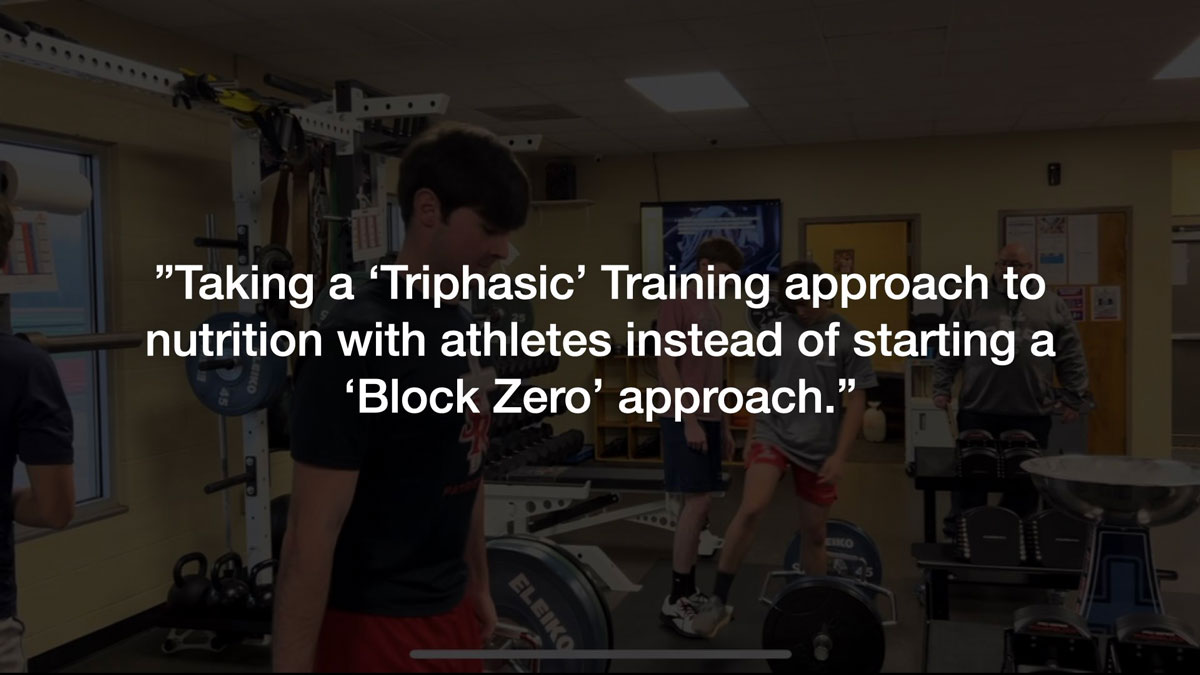Welcome to Part 4 of the Top 5 Coaching Mistakes Undermining Athlete Nutrition. You can catch up here if you missed Part 3, where we explored why posting nutrition charts from social media in your weight room isn’t effective for educating athletes or improving their nutritional habits.
We tend to take a highly dynamic and complex approach to our athletes’ nutrition instead of starting with small basic insights and building on those foundational concepts. Ironically, as strength coaches, we would never take this approach with our athletes’ training. We would begin with a simple ‘Block Zero’ approach, and as the athlete matures and their skill set grows, their strength program evolves into a more complex ‘Tri-phasic’ system.
This statement underscores a critical oversight in how nutrition is often approached compared to training. Here’s an expanded explanation:
- Foundational Understanding: In strength training, ‘Block Zero’ is about instilling fundamental movement patterns, basic strength exercises, and core stability. It ensures that athletes have a solid foundation before progressing to more complex training methods. Similarly, in nutrition, athletes need to understand and master the basics first—such as the importance of macronutrients, hydration, balanced meals, and proper timing of food intake. Starting with these simple insights ensures they have a strong foundation upon which to build.
- Gradual Progression: Just as athletes progress from basic strength training to more advanced systems like Triphasic training, their nutritional education should also follow a gradual progression. Initially, the focus should be on establishing good eating habits, understanding food groups, and recognizing the role of nutrition in performance and recovery. As athletes become more knowledgeable and comfortable with these concepts, more complex topics like nutrient periodization, supplementation, and advanced dietary strategies can be introduced.
- Avoiding Overwhelm: Introducing complex nutritional strategies too early can overwhelm athletes, leading to confusion, frustration, and poor adherence. In strength training, overwhelming an athlete with advanced techniques before they are ready can lead to improper form, increased risk of injury, and lack of progress. The same principle applies to nutrition—starting simple and gradually increasing complexity as the athlete’s understanding and habits develop ensures better adherence and long-term success.
- Building Confidence: Mastery of basic concepts builds confidence. When athletes see success with foundational nutrition strategies, they are more likely to trust and commit to more advanced approaches later. This confidence is similar to the progression in strength training, where mastering basic lifts builds the foundation for more advanced exercises and techniques.
- Customization and Individualization: As athletes advance in their training, programs become more tailored to their specific needs, goals, and responses. Nutrition should be approached in the same way. Initially, broad guidelines may be sufficient, but as athletes mature, their nutritional plans should become more individualized, taking into account their specific metabolic responses, preferences, performance goals, and health needs.
- Holistic Integration: A structured progression in nutrition education allows for better integration with the athlete’s overall training program. Understanding how to align basic nutritional practices with training schedules sets the stage for more advanced strategies that can significantly enhance performance, recovery, and overall health.
By adopting a ‘Block Zero’ approach to nutrition, athletes can build a strong foundation of healthy eating habits and nutritional knowledge. This approach mirrors the logical progression used in strength training, ensuring that athletes are not only physically prepared but also nutritionally equipped to reach their full potential.

The Critical Reload Edge Specialist in Sports Nutrition Certification is designed to support this structured, progressive approach to nutrition education. The certification program provides:
- Basic to Advanced Curriculum: Start with fundamental nutritional concepts and advance to more complex strategies as the participant’s knowledge grows.
- Step-by-Step Guidance: Offering clear, actionable steps that build on each other, ensuring a solid understanding before moving to more advanced topics.
- Practical Application: This approach emphasizes the real-world application of nutritional principles, allowing athletes to see the direct impact of their dietary choices on performance and recovery.
- Customization Skills: Training professionals to tailor nutritional plans to individual athletes’ needs, ensuring optimal results as they progress.
- Holistic Integration: Teaching how to seamlessly integrate nutrition with training programs, ensuring that both aspects complement and enhance each other.
In conclusion, just as effective strength training begins with foundational movements and progresses to advanced techniques, effective nutrition education should start with simple, basic insights and build on those foundations. This structured, progressive approach ensures that athletes develop a deep, practical understanding of nutrition, leading to better performance, improved health, and sustainable habits.
Finalize your exploration with Part 5 of this series, where we discuss how not including parents in your quest for athletes’ better health, performance, and recovery through nutrition will limit any success. You won’t want to miss it!
